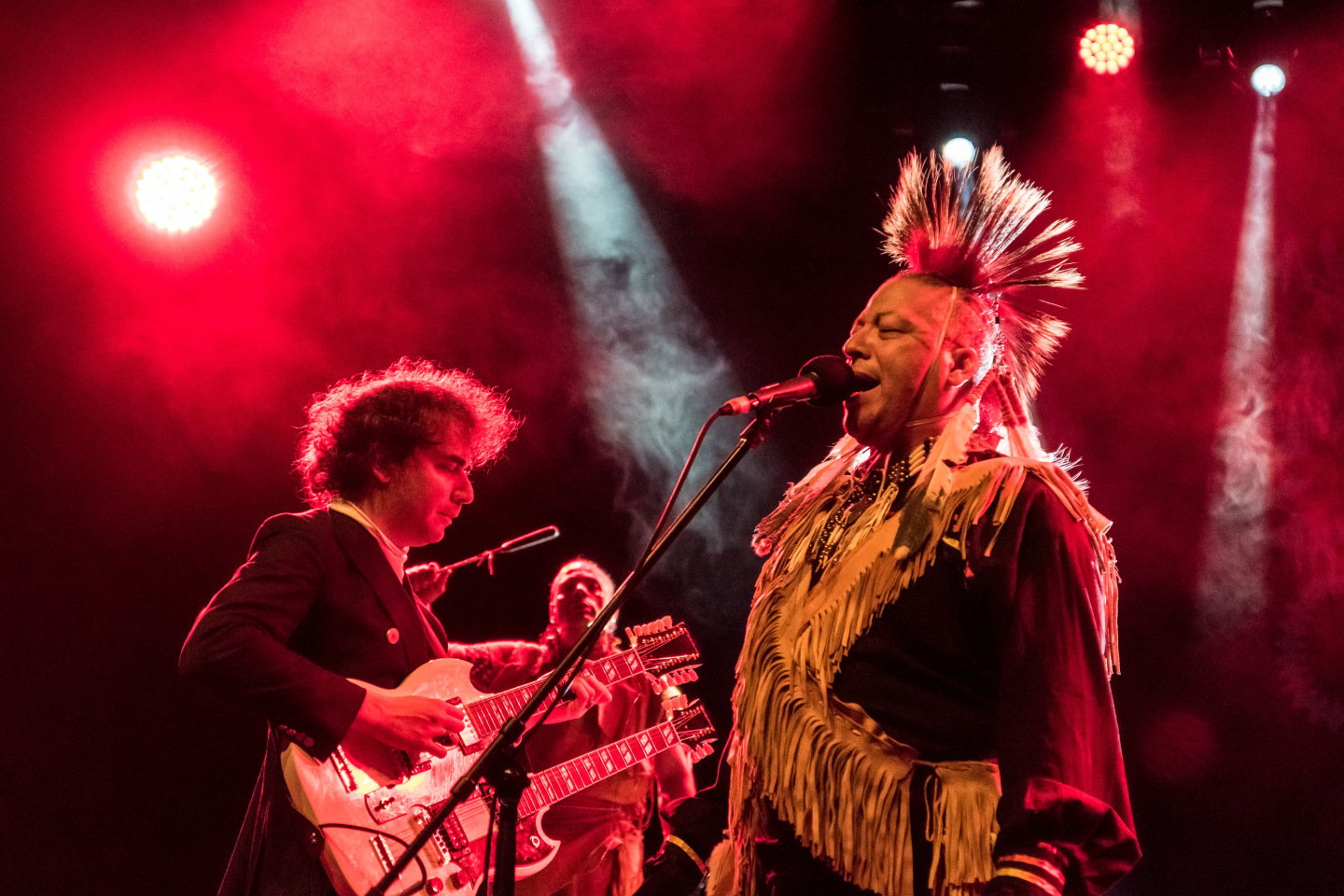How Medicine Singers push powwow music into the avant garde
Daryl Black Eagle Jamieson, Yonatan Gat, and their motley cast break down their self-titled debut album as Medicine Singers, a collaboration years in the making.
 Slavko Pusavec
Slavko Pusavec
South By Southwest isn’t usually the best place to forge a durable creative bond. But in 2017, when the Eastern Medicine Singers — an Eastern Algonquin powwow collective — found themselves on stage with ex-Monotonix guitarist Yonatan Gat, the connection was instant. Five years later, they’ve released their self-titled, collaborative debut LP as Medicine Singers, out today via Stone Tapes/Joyful Noise.
Medicine Singers bridges the gap between deep-rooted tradition and the avant garde. The album features a who’s-who cast of experimental musicians: no wave icon Ikue Mori, noise legends Thor Harris and Christopher Pravdica (of Swans), ambient pioneer Laraaji, hyper-versatile trumpeter jaimie branch, and more. With help from his co-producer Ryan Olson (Gayngs), Gat controls the chaos, expertly interweaving sounds across space and time. The end result comprises 10 songs running the gamut from sacred chants to rock anthems to free jazz freakouts.
On the eve of their new record’s release, bandleader Daryl Black Eagle Jamieson broke it down for The FADER track by track, with help from Gat, Harris, and several of the original Eastern Medicine Singers.
1. A Cry
Daryl Black Eagle Jamieson: The album starts with the voice of Kathitha. She was the daughter of the great chief Leroy Ousamequin Perry, who led the Wampanoag nation from 1926 until his death in the 1960s. He fluently spoke our language and taught it to his daughter. She carried it on to us, as you can hear in this recording of her voice. The song that follows was written by Ian Wapichana from Brazil.
Ian Wapichana: A cry to the sun god, asking him to appear in the winter.
2. Daybreak
Jamieson: A song I wrote for the first light. I took these words from the Algonquin Massachusetts dialect. Right now there’s less than ten people in the world who speak it, which means this recording will help preserve the language for future generations.
3. Hawk Song
Raymond Two Hawks Watson: “Hawk Song“ was inspired by the freedom I felt when dancing in the circle. For our people, the Hawk is considered a messenger, so the Hawk Song is intended to let those who hear it know, “Wunnee Kupumakon! It’s good for you to dance!” I knew the song was well-received by our local communities, but I never expected it would merge so well with more contemporary forms of music until we connected with Yonatan Gat. It just goes to show the power of good music to transcend boundaries and bring people together.
4. Sanctuary
Yonatan Gat: On this song, we did some of the long improvisations that we have fun with on tour. jaimie branch played an unbelievable trumpet solo over Gelbart’s synths and wurlitzer, Ikue Mori did electronics and Laraaji played zither. As producer, it’s an amazing opportunity to get to work with musicians of such vision, who were kind enough to contribute their magic to the Medicine Singers.
5. My Brother
Artie Red Medicine Crippen: When I listen to this song I think about how much I miss my brother Chris, who is singing it. Because of the recording session where we made this song, I got to fly to Canada and see him again after 10 years of us living in different countries. I call him my brother but we are not biological brothers, we just grew up together on the same reservation playing in the same band, Young Blood. We used to sing this song together in Montauk. I think he was testing me — to see if I still remembered the songs we sang together as kids.
6. Shootingstar Press
Jamieson: An ad lib by our Ojibwe brother Joe Rainey. We feel the magic of the Ojibwe people through this song.
7. Sunrise (Rumble)
Jamieson: That’s the jam, right there. “Rumble” changed rock music history and it shows that a lot of Native music influenced these Rock’n’Roll beats. “Rumble” is an extension of our heritage. I’m from the Pocasset tribe and not Shawnee, but I can relate to their struggle. The beat of the song is the heartbeat or double-beat — that’s the heartbeat of the people. To us it’s almost like a resurrection of Link Wray, we put the heartbeat on, to keep his heartbeat alive. It’s a song bringing back a legendary Native, who put the pain of his people into the music. The vocal intro to Rumble is called Sunrise, an ancient song that’s been around for hundreds of years.
8. Shapeshifter
Jamieson: A combination of cultures coming together and creating the ultimate medicine story. The first part of the song is a spoken-word in Lakota by Tom Wunnamwau, who grew up in Pine Ridge. The next part meshes together four different songs, which then led to Artie Red Medicine Crippen singing a dance song called Calumet, one of the oldest eastern dances that exist. The next part goes back to Tom’s spoken word, and the song ends with pure noise like the cry of a thousand ancestors.
9. Sunset
Jamieson: We play the Sunset song at the end of the day, when the sun goes down. Not many people sing these songs anymore — “Sunrise” and “Sunset.” They were given to our drummer Artie Red Medicine Crippen by the great chief Bright Canoe. Artie continues to sing it, and he brought it to our drum. These ancient vocal songs have the name of the creator, Yahweh. You hear it throughout the song, an ancient calling to the creator. It brings great joy to people when we play it. Artie, who brought it to our drum, says it is over a thousand years old. It very well could be.
10. Reprise of a Cry
Gat: “Cry” was chosen to bookend the record because its beauty and softness balance the rhythmic heaviness of the rest of songs. It was beautiful to work on this gorgeous music with Ian in Brazil.
Thor Harris: To play some tension-building marimba rolls under the beautiful howling and guitar tapestry felt like such an honor. Once again, I was in the right place in the right time. With a marimba.
